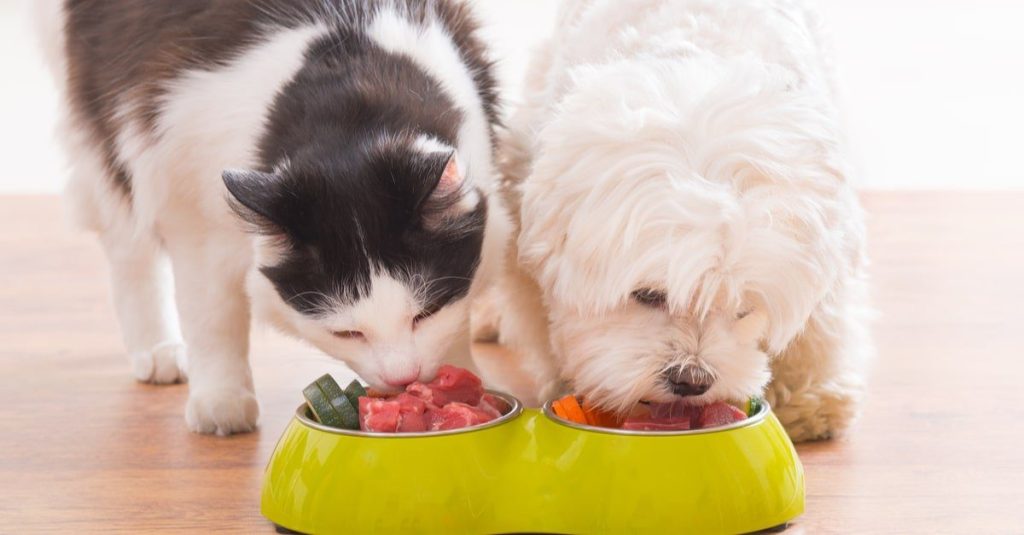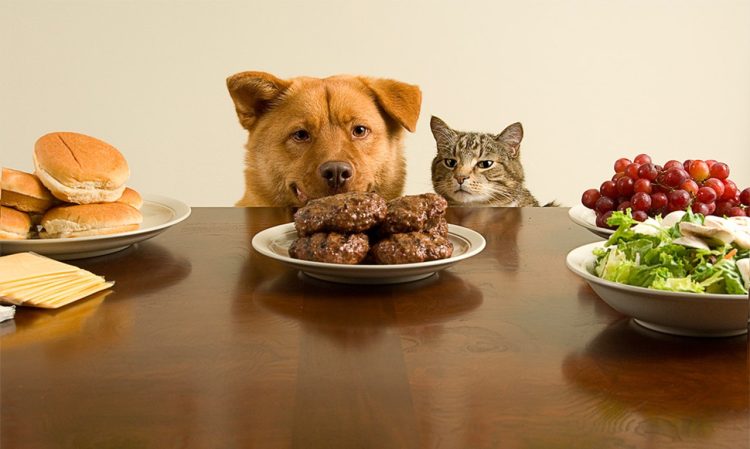Choosing the right food for your pet is one of the most important decisions you’ll make as a pet owner. The right diet can greatly impact your pet’s overall health, energy levels, and longevity. However, with so many pet food options available, it can be difficult to determine which one is truly best for your furry friend. In this article, we will explore what makes up a healthy diet for pets and how to choose the most appropriate food based on your pet’s specific needs.
Understanding Your Pet’s Nutritional Needs
Just like humans, pets require a balanced diet that provides them with essential nutrients for growth, maintenance, and energy. The basic nutrients that are essential for a pet’s diet include:
- Proteins: These are the building blocks for tissues, muscles, and organs. They are essential for growth and repair.
- Fats: Fats provide a concentrated source of energy and help in the absorption of certain vitamins.
- Carbohydrates: Carbs provide energy and aid in digestive health, although some pets may have limited carb needs.
- Vitamins and Minerals: These are essential for many physiological functions, including bone health, immune function, and more.
- Water: Hydration is critical for all pets. Adequate water intake helps with digestion, joint health, and overall well-being.
Now, let’s look at the specific dietary needs for dogs, cats, and other pets.
1. Dog Food: Choosing the Right Diet for Your Canine Companion
Dogs are omnivores, meaning they can eat both animal and plant-based foods. However, they still require a higher amount of protein than humans. Dogs also need a balanced diet of fats, carbohydrates, vitamins, and minerals for optimal health.
Choosing the Right Dog Food:
- High-Quality Protein: Dogs need animal-based protein sources like chicken, beef, lamb, or fish. These proteins provide essential amino acids that are crucial for muscle development and overall health. Look for foods that list high-quality proteins as the first ingredient.
- Balanced Fats: Omega-3 and Omega-6 fatty acids are important for healthy skin, a shiny coat, and proper brain development. These fats are often sourced from fish oils, flaxseed, and other plant-based oils.
- Fiber for Digestive Health: Fiber helps regulate your dog’s digestive system. High-fiber ingredients, like pumpkin, sweet potatoes, or brown rice, are good choices for promoting gut health.
- Avoid Fillers and Artificial Additives: Some pet foods contain fillers like corn, soy, and wheat, which offer minimal nutritional value. Look for foods that are free from artificial colors, flavors, and preservatives.
- Age-Appropriate Food: Puppies, adult dogs, and senior dogs have different nutritional needs. Puppy food should be higher in protein and fat for growth, while senior dog food may have fewer calories to prevent obesity and joint issues.
- Special Dietary Needs: Some dogs may require specialized diets based on health conditions like allergies, diabetes, or kidney disease. Always consult your vet to determine the best food if your dog has a medical condition.
Homemade or Raw Diets for Dogs:
Some dog owners choose to prepare homemade meals or raw diets for their pets. While this can be beneficial, it’s important to work with a veterinarian or a pet nutritionist to ensure that you are providing a balanced, complete diet that meets your dog’s nutritional needs.
2. Cat Food: Understanding Your Feline’s Nutritional Requirements
Cats are obligate carnivores, meaning they require animal-based proteins to meet their nutritional needs. Unlike dogs, cats cannot synthesize certain essential amino acids and must obtain them from animal sources in their diet. Cats also need a higher level of fat in their food than dogs.
Choosing the Right Cat Food:
- Animal-Based Protein: Cats need a diet that is rich in animal protein, such as chicken, turkey, beef, or fish. The primary ingredient in a cat’s food should be a high-quality protein source.
- Taurine: Taurine is an essential amino acid for cats that they cannot produce on their own. It’s critical for heart, eye, and reproductive health. Make sure the food contains taurine.
- Fat Content: Fats are important for energy and coat health. Cats need a higher fat content than dogs, with Omega-3 and Omega-6 fatty acids playing a significant role in maintaining skin and coat health.
- Limited Carbohydrates: While some cats may tolerate small amounts of carbohydrates, they generally do not need grains or starches in their diet. High-quality cat food should have minimal carbs.
- Wet vs. Dry Food: Both wet and dry food have their advantages. Wet food helps with hydration, which is important for kidney and urinary tract health, while dry food is more convenient and can help with dental health. A combination of both wet and dry food may be ideal for most cats.
- Age-Specific Diets: Like dogs, cats have different nutritional needs based on their age. Kitten food is formulated to support growth, while senior cat food is typically lower in calories and designed to help with joint health and weight management.
Homemade or Raw Diets for Cats:
As with dogs, some pet owners opt for homemade or raw diets for their cats. While a raw diet can provide many health benefits, it requires careful planning to ensure the diet is balanced and complete. Work with a veterinarian or a pet nutritionist to create a safe and healthy homemade diet for your cat.
3. Food for Small Mammals: Rabbits, Guinea Pigs, and Hamsters
Small mammals such as rabbits, guinea pigs, and hamsters have specific dietary needs that differ significantly from those of dogs and cats. They are herbivores or omnivores, depending on the species, and require fresh fruits, vegetables, hay, and pellets to thrive.
Choosing the Right Food for Small Mammals:
- Hay: For rabbits and guinea pigs, hay should make up the bulk of their diet. Hay is high in fiber, which aids in digestion and prevents obesity. Timothy hay is the most common option, but there are other varieties like oat hay and meadow hay.
- Fresh Vegetables: Fresh leafy greens such as spinach, kale, dandelion greens, and romaine lettuce are excellent choices for small mammals. Ensure that vegetables are fresh and not too high in oxalates or calcium, which could cause kidney issues in some species.
- Pellets: High-quality pellets designed for rabbits, guinea pigs, and hamsters should complement their diet of hay and fresh veggies. Choose pellets that are free of seeds, nuts, or artificial additives.
- Fruits: Fruits can be given in moderation as a treat, but they should not make up the majority of the diet due to their high sugar content.
- Water: Always ensure that your small mammal has access to fresh, clean water. Water bottles or bowls can both be used, but make sure the water is changed daily.

4. Birds and Reptiles: Tailoring Diets for Unique Needs
Birds and reptiles have unique dietary needs that vary widely across species. Birds typically require seeds, fruits, and vegetables, while reptiles have more specific needs based on whether they are herbivores, omnivores, or carnivores.
Choosing the Right Food for Birds:
- Seeds and Pellets: While seeds are often the foundation of a bird’s diet, they should be complemented with pellets to ensure they receive a balanced nutrition profile.
- Fresh Fruits and Vegetables: Many birds enjoy fresh fruits like apples, berries, and vegetables like spinach and carrots. Be sure to avoid toxic foods like avocado or chocolate.
Choosing the Right Food for Reptiles:
- Herbivorous Reptiles: If you have a herbivorous reptile like a tortoise, leafy greens, fruits, and vegetables should make up the majority of their diet. Avoid feeding them high-protein foods like meat.
- Carnivorous Reptiles: Carnivorous reptiles, such as some snakes or lizards, require a diet of insects or small mammals. Make sure to feed them appropriately sized prey and avoid feeding them wild-caught animals, which may carry diseases.
Conclusion
Providing your pet with the best diet is key to maintaining their health and happiness. Each pet species has unique nutritional requirements, so it’s important to choose food that matches their specific needs. Whether you have a dog, cat, small mammal, bird, or reptile, ensuring that your pet receives high-quality protein, the right fats, sufficient fiber, and essential vitamins and minerals will support their overall well-being. Always consult your veterinarian for tailored dietary recommendations, especially if your pet has special health concerns. By giving your pet the right food, you are ensuring they live a long, healthy, and active life.























































